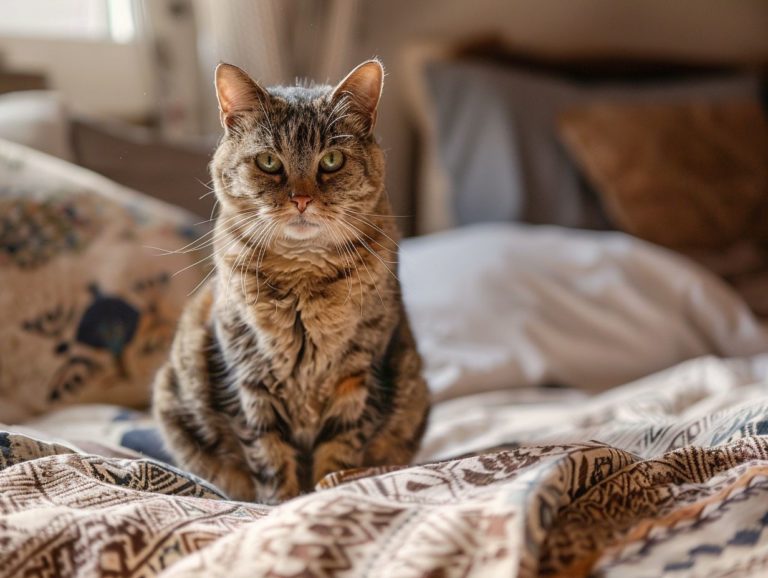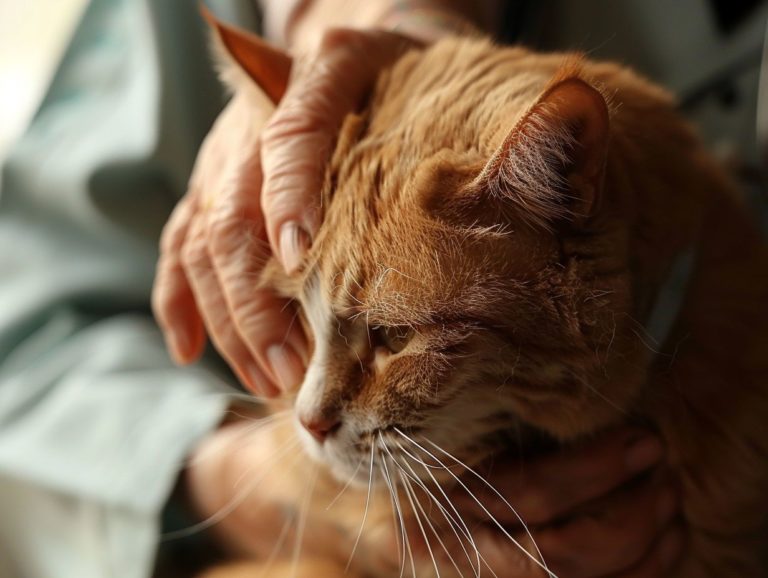Finding A Senior Cat Insurance Plan With Dental Coverage
This comprehensive article explores senior cat insurance, emphasizing the significance of dental coverage for senior cats. It delves into the importance of senior cat insurance in light of evolving healthcare requirements, provides guidance on selecting a senior cat insurance plan with an emphasis on dental coverage, compares top insurance options, offers a step-by-step guide on applying for senior cat insurance coverage, and presents tips for preserving the dental health of senior cats.
The aim of the article is to assist individuals with senior cats in gaining a deeper understanding of this subject and in making better-informed decisions regarding the care of their senior cats and their dental health.
Key Takeaways:
1. Senior cat insurance with dental coverage is crucial for maintaining the health and wellbeing of your aging feline friend.
2. Consider factors such as your cat’s age, health, and coverage options when selecting a plan.
3. Research and compare top senior cat insurance plans to find the best fit for your cat’s needs.
Understanding Senior Cat Insurance
Understanding Senior Cat Insurance involves familiarizing yourself with the coverage options and plans available to safeguard your aging feline companion from sudden illnesses and accidents. It is essential to select a reputable insurance provider that offers comprehensive coverage, including dental care, to ensure your senior cat receives the necessary care for common senior cat conditions and accidents.
Coverage for common senior cat conditions like kidney disease, hyperthyroidism, and arthritis should be included, as these are prevalent issues in older cats that may necessitate long-term treatment. Additionally, coverage for accidents such as falls or injuries from altercations with other animals should be considered.
Dental care is crucial for senior cats, as dental problems can lead to serious health issues. Therefore, it is vital to opt for a plan that covers dental cleanings, extractions, and other dental procedures to uphold the overall health and well-being of your cat.
What is Senior Cat Insurance?
Senior Cat Insurance is a specialized type of pet insurance tailored for older cats to address their unique healthcare needs. Typically, Senior Cat Insurance provides coverage for illnesses, accidents, routine check-ups, and dental care to ensure that older cats can access necessary treatments without financial strain.
It is important to note that Senior Cat Insurance policies may have waiting periods before certain coverage options become effective, so reviewing the policy details is crucial. Common exclusions in Senior Cat Insurance policies may encompass pre-existing conditions, hereditary conditions, elective procedures, and specific treatments such as alternative therapies or cosmetic procedures.
Understanding coverage limitations, such as annual or lifetime benefit caps, is essential to effectively managing your senior cat’s healthcare requirements within the confines of the policy.
Importance of Dental Coverage for Senior Cats
Dental coverage is essential for senior cats to maintain their overall good health and quality of life. Advances in veterinary dentistry have revealed that older cats are more susceptible to dental diseases, such as periodontal disease. This underscores the importance of regular dental cleanings and treatments for senior cats to prevent further complications.
Regular preventative dental check-ups for older cats can aid in the early detection of dental issues, allowing for timely interventions. Untreated periodontal disease in cats can lead to pain, tooth loss, and potential systemic health problems.
Senior cat owners who invest in comprehensive dental coverage ensure that their aging feline companions receive the necessary care and procedures to preserve the health of their teeth and gums, ultimately enhancing their quality of life in their later years.
Factors to Consider when Choosing a Plan
When selecting a pet insurance plan for your senior cat, several factors should be taken into consideration, including the cat’s age, current health condition, available coverage options, exclusions, and the inclusion of dental care. These factors are crucial in determining the appropriateness of the plan for the specific needs of the senior cat.
The age of a senior cat is a significant factor in the cost and coverage of cat insurance, as older cats are more likely to have health issues that require comprehensive coverage. Assessing the current health condition of a senior cat is essential to ensure appropriate coverage of pre-existing conditions, whether they are covered or excluded.
Coverage options can vary from basic accident-only plans to more comprehensive plans that include wellness care and coverage for chronic conditions. Understanding the exclusions in the policy is important for evaluating how well the insurance plan aligns with the senior cat’s needs and for managing veterinary costs and avoiding unexpected expenses.
The inclusion of dental care is another important consideration when choosing a pet insurance plan for senior cats, as some plans may offer coverage for dental care.
Age and Health of Your Cat
Age and health are two important factors that influence the selection of an insurance plan for your cat. Older cats are more likely to have pre-existing conditions, prompting the insurance provider to review the cat’s medical records for appropriate coverage of existing conditions.
Understanding and documenting an aging cat’s medical history is crucial for determining the type of insurance coverage, as it significantly impacts the acceptance of claims. Pre-existing conditions, such as chronic medical problems or surgeries, can impact the available coverage options for your cat.
Accurate documentation of your cat’s medical history enables you to provide precise information to the insurance provider, allowing for a proper assessment of your cat’s health risks. This ensures that the insurance policy for your cat is tailored to their specific needs, providing reasonable benefits for future health issues.
Coverage Options and Exclusions
It is important to understand the coverage and exclusions in a senior cat pet insurance plan to ensure that your senior cat receives necessary treatments for illnesses and conditions. Always review the policy details to grasp what treatments are covered and excluded. Common exclusions in senior cat pet insurance plans include pre-existing conditions, elective procedures, and cosmetic treatments.
Some policies have coverage limits, annual deductibles, and age requirements for enrollment. When selecting a plan, make sure that essential treatments such as regular check-ups, chronic disease management, and emergency care are covered to meet the health needs of your senior cat.
Top Senior Cat Insurance Plans with Dental Coverage
Comparing the best senior cat insurance plans with comprehensive dental coverage allows pet owners to provide optimal care and treatment for their older cats. By comparing the features and benefits of different plans, pet owners can select the most suitable option for their senior cat’s specific needs.
This evaluation includes assessing factors like annual limits, waiting periods, and coverage for dental issues such as periodontal disease and tooth extractions. Some plans may offer additional coverage for chronic conditions or alternative therapies, while others may focus more on dental care.
Through comparison, pet owners can also grasp the exclusions and limitations, such as pre-existing conditions or procedures not covered by the plan. Understanding these details give the power tos pet owners to make informed decisions when choosing senior cat insurance.
Comparison of Plans and Benefits
When comparing different senior cat insurance plans, you can understand their variations in coverage benefits for common illnesses, dental care, and emergency treatments, allowing you to make an informed decision about the best insurance plan for your senior cat.
Senior cat insurance plans differ in the types of coverage they offer, with some focusing on comprehensive coverage for chronic conditions like kidney disease or diabetes, while others prioritize preventive care such as vaccinations and wellness exams.
A key advantage of senior cat insurance is the financial protection it provides against unexpected medical costs, alleviating the financial burden on pet owners. However, certain limitations may exist on some plans, such as exclusions for pre-existing conditions and age restrictions, which should be considered when selecting the right insurance plan for your senior cat.
How to Apply for Senior Cat Insurance
Applying for senior cat pet insurance involves several steps, including enrollment, reviewing policy conditions, and submitting relevant medical records to ensure successful coverage for a senior cat.
- Enrollment is the initial step in the process, where basic information about the pet, such as age, breed, and medical history, is collected.
- Once enrollment is completed, the next stage involves reviewing policy terms. This includes understanding the type of veterinary care covered, any exclusions to coverage, deductible amounts, and reimbursement options. Reviewing policy terms is essential for pet owners to grasp the extent of coverage and how to effectively utilize the insurance for their senior cat.
- After reviewing the policy terms, the final step is gathering and submitting the senior cat’s medical records. These records detail past treatments, vaccinated diseases, and any pre-existing conditions. Submitting these records is crucial to ensure that the insurance company can provide appropriate coverage and that the pet can receive necessary veterinary care.
Step-by-Step Guide
- A step-by-step guide for applying for senior cat insurance simplifies the process for pet owners and helps ensure they navigate each stage without errors.
- From researching and enrollment to policy review and submission of medical records, following this guide can assist you in selecting and purchasing the right insurance policy for your senior cat.
- To begin, research different insurance providers offering policies that cover senior cats and cater to their unique healthcare needs, including pre-existing conditions and age-related illnesses.
- Once you select a provider, start the enrollment process by completing the application form accurately, providing details such as your cat’s medical history, age, and past treatments.
- Be prepared to submit documents like veterinary records and proof of age to support the application.
Tips for Maintaining Your Senior Cat’s Dental Health
Dental care is essential for maintaining the overall health and quality of life of senior cats, and the risk of dental diseases can be reduced through preventive care and at-home dental practices in later years.
Regular dental check-ups at the veterinarian are crucial for early detection and treatment of dental issues in senior felines. Veterinarians are able to perform professional cleanings and provide treatment for dental problems in senior cats. Additionally, pet owners can offer dental treats or toys to their senior cats to chew on, which can promote oral health.
Brushing a cat’s teeth a few times a week with a pet toothbrush and pet toothpaste can help in minimizing plaque and tartar buildup. It is important to avoid giving cats human toothpaste or medications without consulting a veterinarian. Maintaining a healthy smile can contribute to a longer life for senior cats.
Preventive Care and At-Home Dental Care
Maintaining good dental health for your senior cat involves preventive care and at-home dental practices. Regular dental examinations, proper oral hygiene routines, and a balanced diet are essential for preventing common dental diseases and ensuring optimal teeth and gum health. As cats age, they become more vulnerable to dental problems like periodontal disease, tooth decay, and oral infections.
Implementing a daily at-home dental care regimen, such as brushing your cat’s teeth with a veterinary-approved feline toothpaste, can significantly reduce plaque and tartar buildup. Additionally, dental treats or toys designed for dental health can help keep your cat’s teeth healthy and clean. Watch out for signs of discomfort, such as refusal to eat or pawing at the mouth, as these may indicate dental issues that necessitate prompt attention from a veterinarian.
Frequently Asked Questions
What is a senior cat insurance plan with dental coverage?
A senior cat insurance plan with dental coverage is a type of pet insurance that provides coverage for dental care specifically designed for senior cats. This type of insurance typically covers routine dental cleanings, as well as more extensive procedures such as tooth extractions and root canals.
Why is it important to find a senior cat insurance plan with dental coverage?
As cats age, they become more susceptible to dental issues such as periodontal disease and tooth decay. These issues can be costly to treat and may require multiple visits to the vet. Having a senior cat insurance plan with dental coverage can help alleviate the financial burden of caring for your aging cat’s dental health.
What should I look for when choosing a senior cat insurance plan with dental coverage?
When choosing a senior cat insurance plan with dental coverage, it’s important to consider the coverage limits, waiting periods, and exclusions. You’ll also want to make sure the plan covers both routine dental care and more extensive procedures.
Are there any age restrictions for senior cat insurance plans with dental coverage?
Most insurance providers have age restrictions for enrolling in a senior cat insurance plan with dental coverage. These restrictions may vary, but typically cats must be between 7-10 years old to qualify for this type of insurance.
Are pre-existing dental conditions covered by senior cat insurance plans?
No, most senior cat insurance plans with dental coverage do not cover pre-existing dental conditions. It’s important to enroll in a plan before your cat develops any dental issues in order to receive coverage for those issues.
How do I file a claim for dental coverage under my senior cat insurance plan?
To file a claim for dental coverage under your senior cat insurance plan, you will need to submit a claim form, along with any relevant invoices and receipts, to your insurance provider. Be sure to follow the instructions provided by your provider and keep copies of all documentation for your records.


